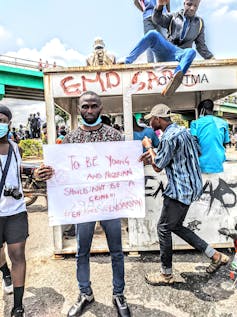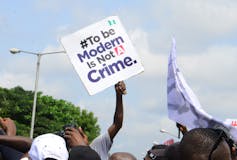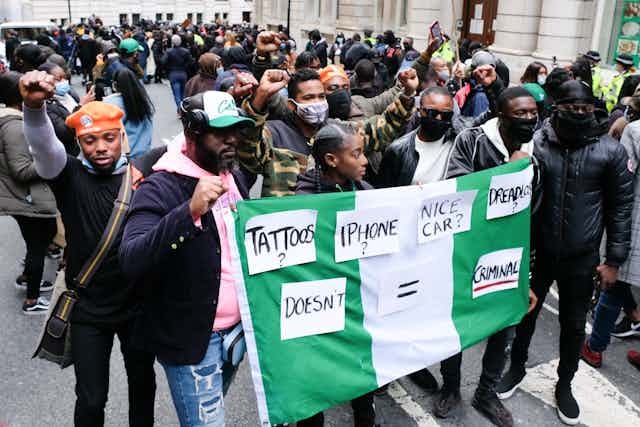Two days after Nigeria celebrated its sixtieth year of independence, a video of a young man brazenly killed by a member of the notorious Special Anti-Robbery Squad or SARS caught the attention of netizens. The Twitter user who posted the viral video claimed the man’s body had been left at the side of the road and his Lexus stolen. It sparked a wave of protests across most of Nigeria’s urban metropolises. Under the moniker #ENDSARS, the protests have garnered support from Nigerian celebrities, Nigerians in the diaspora and even international stars such as John Boyega, Mesut Özil, Kanye West and Cardi B.
The protests could be said to fit neatly into the ongoing global campaign against police brutality, especially against black people. One could even argue that the restrictive context of the COVID-19 pandemic contributed to tensions behind this sudden civil eruption. Whatever the case, one thing is sure: Nigerians have been driven up the wall by an autocratic political system disguised as a liberal democracy.
I argue that the protest placards demonstrate the idea that #ENDSARS on social media and on the streets is as much an expression of a will to modernity by Nigerian youths as it is a yearning to be treated with dignity.
(Young) Nigerian lives matter
As a unit of the Nigeria Police Force, SARS was set up in 1992 to stem armed robbery, car snatching and kidnapping. It appears to have metamorphosed into a pernicious force, called out by Amnesty International as early as 2016. In fact, the #ENDSARS hashtag had been in circulation since at least 2017 and the Nigerian government has reportedly disbanded and reinstated SARS four times in the past four years.

Amid fury at SARS brutality and killings, protesters and online accounts also accuse the police unit of unfairly profiling young Nigerians – especially those who use iPhones, drive luxury cars and wear brands such as Nike or Adidas. The squad is also accused of having maltreated young people with piercings, tattoos and dreadlocks. In other words, Nigerian youths (once scornfully referred to as lazy by the nation’s president) are at the forefront of the #ENDSARS revolution precisely because they are commonly the main targets of SARS’ violence.

Many of the #ENDSARS placards contain phrases such as, “To be modern is not a crime”; “iPhone, laptops, styled hair and living fresh isn’t a crime”; “We are techies not thieves”.
It is quite absurd that people get arrested and tortured simply because of how they look or what gadgets they possess, but this is the daily reality of many young Nigerians. In my view, the iconic #ENDSARS protest placards flooding social media have wider implications. One of these is that they reveal Nigeria’s ongoing and deep-seated struggle to establish itself as a modern democracy. They also point to a new generation of Nigerians (the ENDSARS generation?) rising to take their place in national affairs. This seemingly courageous and woke crop of young Nigerians use social (and traditional) media to make their voices heard to fight for their country’s endangered democracy.
To be modern is not a crime
The placards raise many questions: Why is being modern criminalised in 21st century Nigeria? Why is it so important that Nigerian youths claim their right to be modern? What and whose modernity are they alluding to? These questions may seem peripheral in the face of the daily lived violence young Nigerians are subjected to but they are, in the long run, important.
The demand for the decriminalisation of modern sensibilities in the protests is not necessarily a demand for periodised modernity because, by many standards, Nigeria is a modern country. Also, it is not that SARS is pre-modern in its operation but rather that it is anti-modern in its persuasions. Hence, the expression of the will for modernity in the context of the protests is an ideological and ontological quest for freedom, rationalisation, professionalism and representative democracy as well as rejection of tradition.
The fact that SARS reportedly preyed on signs of ostentatiousness among young people is reflective of Nigeria’s still prevalent embrace of oppressive orthodoxies. It reflects paternalistic social relations and work culture – which extends to the entire Nigerian civil service – that fuel the infantilisation of Nigerian youths. It also partly explains the blanket disavowal of post-traditionalism and the demonisation of the technology and fashion of progressive youth culture.
Put differently, the #ENDSARS movement is symbolic of many things, one of which is a generational divide in ideological posturing. The older generation seems intractably establishmentarian while the younger generation is becoming increasingly radical.
Also, at the heart of the issue is the policing of appearance and mannerism. In my view, SARS officers and the Nigerian government in general conflate the aesthetics of modernity – displayed among young Nigerians – with vices such as scamming, debauchery and insolence. The #ENDSARS protest is, among many other things, a yearning by young people to be respected as full human beings. It is also a wilful engagement in acts of civil disobedience as a way of fashioning a truly civil society.
‘A freedom to be, to do’
As I write, SARS has been dissolved. The victory for the protesters came at a price. Some were reported dead and countless others injured at the hands of the police during the protests.
However, one cannot be celebratory when one considers that SARS has a history of reinventing itself. As we speak, SWAT (Special Weapons and Tactics), a replacement for SARS, has been announced to the displeasure of many Nigerians.
Read more: Why disbanding the notorious anti-robbery squad won't stop bad policing in Nigeria
The #ENDSARS revolution attests to the idea that the Nigerian people, especially young Nigerians, are capable of challenging the systemic failures and deteriorating public services that plague their country. The #ENDSARS protests (arguably the biggest civil revolt in Nigeria since the time of the last military regime in 1999) are still unfolding. Many hope they will form a social movement that marks the genesis of a long walk to radical change in the structures of governance in Nigeria.
Watching the protests, I am reminded of a scene in Chimamanda Ngozi Adichie’s Purple Hibiscus, a novel which allegorically portrays the repressive regimes of former leaders Sani Abacha and Ibrahim Babangida in Nigeria. In it, the young protagonist, Kambili, longs for a different kind of freedom, “a freedom to be, to do”. In the same manner, the #ENDSARS protest is a yearning for freedom, a freedom to be, a freedom to do.

